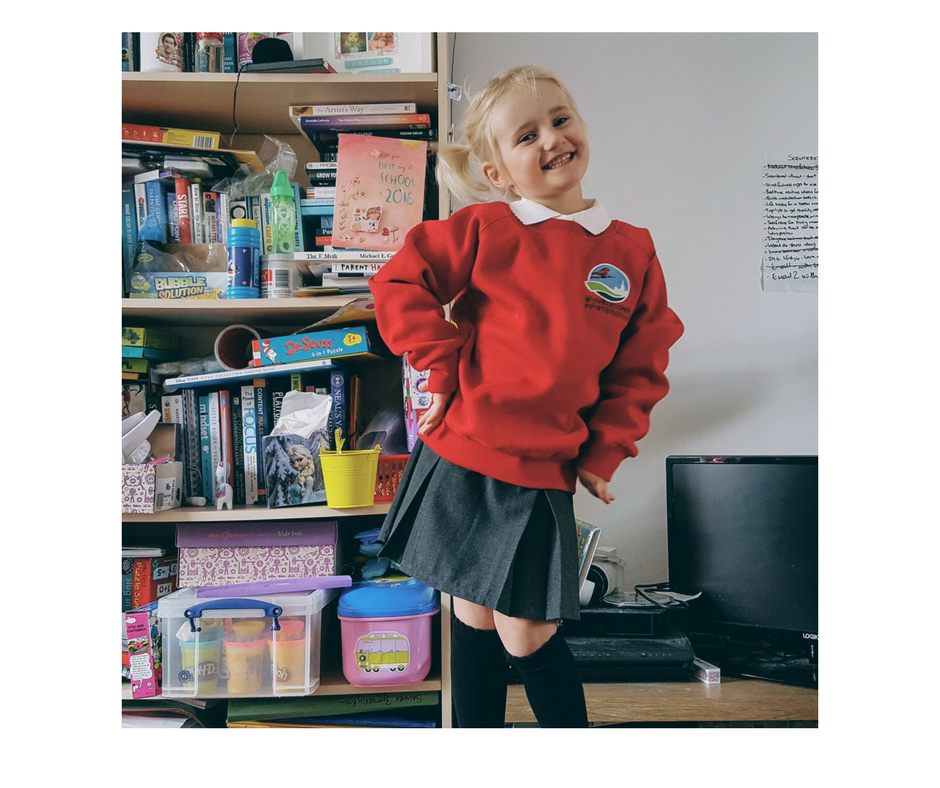This time last year, we were preparing for S to begin her reception year at school. Since she was already doing more hours at nursery than she would be at school (albeit over four days) I didn’t think there would be much of an issue with transitioning over to school. I was wrong!
I’m far from an expert, but these are the things I learned about what you really need to do, to prepare your child (and yourself) for reception year at school.
- Don’t bother about name writing. Seriously, this is what school is for; they’re there to teach and spending time trying to get your child to write their name is time you could be spending on other things.
- That said, do make pens and pencils readily available so that your child can get used to holding them and making marks. This will help them to be prepared when it comes to writing letters in the classroom.
- Get them used to recognising their own name written down. If you call them by a shortened version of their name, make sure they know what the longer version looks like, and that they may be called it at school, at least until they’re made aware of the shorter version.
- Learning to read before school could do more harm than good. These days they teach phonics, and whether your child is a brilliant reader or not, they will still sit on the carpet at school each day and learn a different sound. What I hadn’t realised is that when they get to Year 1, children take the National Phonics Screening, where they need to be able to identify phonics. So a child who has learned to sight read may well end up being at a disadvantage.
- Read to them lots. I was surprised at how quickly S came home with a reading book and a notebook to record our daily reading. If you’re already in the habit of sitting together to look at books, they will find this easier.
- Practice getting dressed and undressed: shoes; socks; buttons; poppers; trousers; tights; jumpers. All of these can pose a problem when it’s time to change into PE kit and even the best teacher in the world cannot change 30 kids’ clothes and still have time for anything else in their day. Also bear in mind things like undoing a button on a pair of trousers when desperate for a wee.
- Practice going to the toilet in different places. This one sounds really silly but when S first started at school she had several accidents because she was unsure of her surroundings. They get so into what they’re doing at school that they often leave it until the very last minute to go to the toilet, which means even a slight delay can mean an accident.
- Practice nose blowing, and knowing when it needs to be done. And accept that for the first term or more, your child will have a cold and be plastered in snot at all times. S is pretty good with nose blowing, but the thing is it’s just so exciting being in a reception classroom with endless fun activities; blowing one’s nose is just not top of the agenda! You’ll probably find your child comes out covered in snot any way, but don’t expect anyone to wipe their nose for them!
- Work on independence at meal times. Cutting up food, opening lunch boxes or undoing drinks are all things the staff at school will help with… but they’ll have several other children to help too so it’s easier for all concerned if your child can master these things before going to school.
- Work on your friendly smile and small talk! One thing I was definitely not prepared for was that while the kids wander off to make new friends in the classroom, for the parents hanging about in the playground it can feel a lot like the first day of school too. Come armed with some polite chit-chat, and make an effort to remember names – and which parent belongs with which child! I wasn’t prepared for this at all and it took me the whole school year to figure out which mum belonged to which child. There are still some I can’t match up!
- Talk a lot with your child about school. Talk about how their day will look, what will happen etc. The more they’ve been talking about it (in a positive way, obviously) beforehand, the less alien it will feel when it begins. With S I also walked to the school with her so that she could see the buildings etc.
- Explain that mummies (and daddies) are not supposed to be in the classroom; it is for children. At S’s school they gave us a few days of bringing children in before they asked us to all please just leave our children at the door. If you’re used to bringing your child into nursery, helping take their coat off and perhaps handing them over to a staff member, this can feel really weird – but they adapt very quickly and cope better if going into the classroom on their own is just the norm.
- Be prepared to know nothing about what goes on once they get to the classroom. I was used to collecting S from nursery and having a brief chat with her keyworker about her day, what she’d been up to, what had gone well. When they get to school this stops and you barely even see the teacher or TAs. If there’s something you really need to know, they will either come out to the playground to speak to you or ask you to come into the classroom. Otherwise you’re often left with a child who’s too tired to tell you what they’ve done. (I did write a post about getting your child to tell you what they’ve done at school but it’ll probably be a few weeks before any of this is successful!)
- Your child will at some point come home and tell you another child hit them/pushed them/called them a name. There is no point in speaking to the school about it unless it appears to be happening more than once, or they’ve come out with a physical bruise or something. Kids are kids and these things happen; use it as a way to chat about how everyone is different and some people struggle to contain themselves when they’re feeling excited or overwhelmed.
- Prepare for your child to be the most tired they have ever been. I thought that since S was already in nursery four days a week, and doing long days for two of those, school would be a breeze. We were usually pretty active on our day off any way, so surely adding in a fifth day wouldn’t make much difference, surely. How wrong I was! For the first term of school, she was just knackered all the time. She loved school and getting out of bed in the mornings wasn’t a problem – but the afternoons and weekends were largely a write-off. For the first two days of the Christmas holidays she lay on the sofa under a blanket watching TV and I thought she must be coming down with something – but the poor thing was just recovering from a term of being permanently shattered!
- Buy more uniform than you think you need. Five skirts or pairs of trousers and five polo shirts might seem a bit excessive but trust me, you’ll need them. By the time she left nursery S usually managed to come home relatively clean so I thought we’d be ok – but the ratio of staff to children is much higher in a nursery setting; they’re watching them all the time, making sure aprons are on and that food is not spilled. Teachers, TA and lunchtime staff don’t have the capacity to watch every child, all the time – even your beautiful, unique snowflake can go under the radar sometimes. At first I was horrified to see S coming out of school with food from lunch still smeared across her face but then I realised that the staff just don’t have time to run around after this sort of thing all day; they need to do some actual teaching!
- Just accept that your child will get nits. Everyone gets nits. Even if you’re the most vigilant parent in the world, nits will happen. And you’ll be horrified, and you’ll do the nit comb thing and buy loads of stinky products… and then nits will happen again and still the world will not end because of it. Nits are just what happens when you get 30 kids all sitting close together for several hours per day.
- Accept that other people have different ways of doing things, different discipline, different levels of acceptable behaviour. I am quite strict with S in the playground and like for her to stay where I can see her. She’s also not allowed on the grass when it’s wet because the law of the sod dictates that she will fall over and get covered in mud before the day has even started. Other parents are less strict, and it can be tricky to cope with the differences in what individual children are and are not allowed to do.
- Label everything. And I mean everything! Even the things you think your child would never take off while at school! If your child’s coat has a detachable hood, label that. Socks; shoes; underwear; wellington boots. Literally everything. It’ll still get lost but with a bit of luck it will make its way back to you eventually.
- Try to avoid letting them take toys into school. The teacher is already trying to keep control of 30 small, over-excited (and then over-tired) people. They don’t have time to chase around after lost toys as well. If they insist on taking a toy in, try and explain to them that this may well mean it ends up lost.
Have I missed anything? If there’s something you wish you’d been told about preparing for reception year, do leave a comment!




0 Comments